Fulbright scholar and Pitzer grad, 23, works to eradicate measles
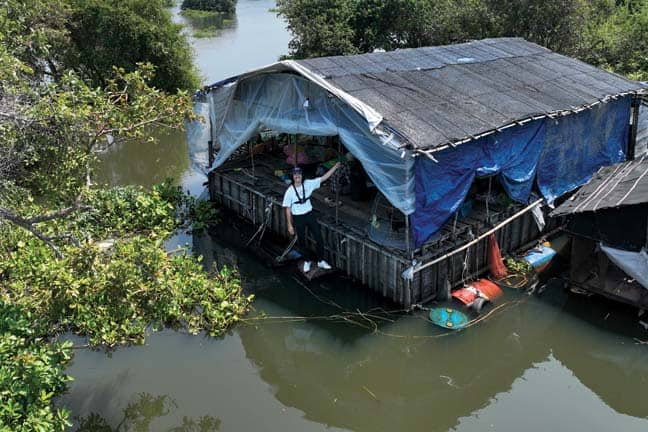
Ben Sievers, a 2022 Pitzer College graduate, has been conducting research in Cambodia since last September as a Fulbright Scholar with the Institut Pasteur du Cambodge, a nonprofit public health institute. He is pictured here on a floating chicken farm. Sievers conducts avian influenza surveillance throughout the country, including its many boat-dwelling communities. Photo/by Jurre Siegers
by Lisa Butterworth | special to the Courier
Pitzer College biology grad Ben Sievers is very comfortable wearing a crisp white coat in the sterile environment of a lab. That’s been his M.O. for the last several years as a research fellow at the J. Craig Venter Institute in La Jolla. These days, work looks a little different for the 23-year-old.
“Picture me — I have this big blue tarp on, three layers of gloves, these white boots, and two masks. We’re at a pig slaughterhouse and there’s like a thousand pigs,” he said. “It’s blazing hot and I’m sweating through all my layers of personal protective equipment. Everyone’s watching me, chasing these pigs trying to swab their noses.”
Sievers, who graduated from Pitzer in 2022, has been in Cambodia since September of last year; part of his field work includes surveying slaughterhouses and live bird markets for influenza and other viruses. “I did not expect to do this when I first got here,” he said with a laugh. “But it’s been a great experience.”

Ben Sievers is pictured here on a floating chicken farm in Cambodia. Sievers conducts avian influenza surveillance throughout the country, including its many boat-dwelling communities. Photo/by Jurre Siegers
The search for swine and avian flus is actually a bit of bonus research Sievers has been able to embark on. His main purpose for traversing to Southeast Asia is part of a larger, lifelong goal: to eradicate measles. It’s something he’s so driven to do, even a major health development did not derail his plans. In fact, he’s still in treatment, flying back to the States every few months for appointments with his medical team. But Sievers, a preternaturally positive person, has managed to find inspiration in the experience and an even greater connection to the work he’s doing.
Though he spoke to the Courier by phone from Phnom Penh, Cambodia’s capital, Sievers spends much of his time in Prek Toal, where residents of Cambodia’s floating villages experienced a measles outbreak a few years ago. “I remember I was reading the [World Health Organization] briefing, and I was like, Why did they have a measles outbreak? Cambodia was one of the places that actually eliminated measles years back,” he said.
As it turns out, the floating villages are quite difficult for vaccination campaigns to reach, especially since the residents are often not associated with a hospital or medical facility. “I was really interested in figuring out ways we can get vaccine access to these communities,” he said.
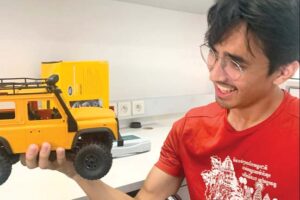
Sievers is seen here with a remote control truck he modified to house an air sampler for viral sampling from a safe distance. Photo/by Jimmy Cadenes
Sievers is conducting his research in Cambodia as a Fulbright Scholar with the Institut Pasteur du Cambodge, a nonprofit public health institute. He also received support from a program much more local in scope: the Napier Initiative, a partnership between the Claremont Colleges and Pilgrim Place, one of our longstanding senior living communities. Every year, each of the seven Claremont Colleges nominates a few students for this intergenerational mentoring program, seniors who are strongly dedicated to social change and have a specific project they’re looking to carry out after graduation. Each fellow is paired with a Pilgrim Place mentor for the year; two are then chosen to receive $20,000 grants. Sievers won one of the Napier Awards for the 2021-22 year.
“I love the Pilgrim Place and Napier community. They’re amazing,” Sievers said. His mentor was Pilgrim Place resident Pat Wall. “After classes I would [meet Pat at] the park right next to Pilgrim Place. She worked in Tangier for a long time, working on eliminating tuberculosis, so she had so much wisdom for me. We’d just walk around and talk and talk and talk,” he said.
This kind of community building and pursuit of social change speak to the reasons Sievers came to Claremont for his undergraduate degree to begin with. “I chose Pitzer specifically because they’re really interested in activism and justice, and this idea of working with people,” he said. “I really love the idea of working with community and having a life of service.”
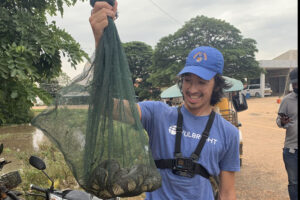
Sievers: “As we were disembarking the boat in the northern region of Cambodia after a long week of virus surveillance, our colleague captured a large snake. He let me hold it despite my initial terror. Exciting!” Photo/by Jurre Siegers
Sievers became interested in viruses, and measles in particular, during his time at Pitzer. His obsession was sparked by David Quammen’s “Spillover,” a book that chronicles the emergence of a number of viruses, including HIV, Ebola, and SARS-CoV-1. “It’s kind of weird to say, but I love viruses. I think they’re amazing,” Sievers said. “They’re so simple yet so complex at the same time. I mean, you can have a virus that only encodes six or seven genes — very, very simple — and it can absolutely cause havoc in the human body. Like, crazy havoc.”
Take Sievers’s family history into account, and it’s easy to see why, of all the world’s viruses, measles is the one he’s truly committed to eliminating. His grandfather, a chemical engineering scientist, led the team that invented the inhalable measles vaccine in 2010. “He’s in his late eighties now, so he’s passed the baton to me,” Sievers said. “I’ll be spending my life trying to eradicate this disease.” Sievers’s twist on his grandfather’s breakthrough is in the administration — he wants people to be able to vaccinate themselves. With the aerosolized inhaler Sievers is envisioning, an entire village could be cheaply vaccinated in minutes.
“Measles is so overlooked because it doesn’t really affect developed nations. But over 100,000 children die of measles every year, and it’s 100 percent preventable,” Sievers said. “During the pandemic we had to cancel a lot of vaccination campaigns, and that left a lot of children vulnerable to measles infections. I foresee a lot of measles infections in the coming years, and that’s scary to think about. My goal is to help prevent these completely preventable deaths.”
Over the next few months, in addition to helping the World Health Organization coordinate a catch-up measles vaccination campaign, Sievers will survey 200 Cambodian families to better understand their views on viruses and vaccines, and ultimately find out whether they’d be willing to vaccinate themselves. Though most of the Cambodians Sievers interacts with speak little to no English, he’s been trying to quickly pick up Khmer, the local language, and says he has felt incredibly welcomed.
“Every household we go to, they always meet us with food — lots and lots of food. I was doing field missions on floating duck farms, and these families don’t have that much food, but whenever we’d come over, they’d kill and cook a chicken for us, even if they only had three chickens,” said Sievers, who quickly realized that putting a pause on his vegetarianism would make eating in Cambodia much easier. “They’re so, so generous.”
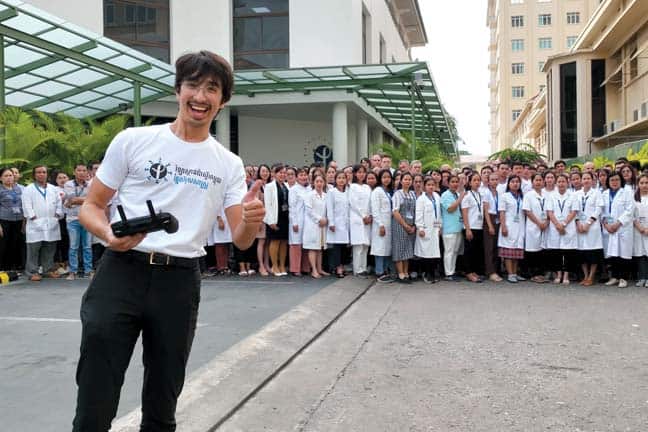
Sievers is pictured here using a drone to take a group photo of his colleagues at the Institut Pasteur du Cambodge. Photo/by Ben Sievers
But dietary shifts and language barriers aren’t the only challenges Sievers is meeting head on with positivity. Last year, he discovered what felt like a “rubbery node” at the base of his neck. When his oncologist father told him to get it checked out immediately, he knew it was something serious. Sievers was diagnosed with metastatic thyroid cancer, and the nearly footlong scar that begins below his ear is evidence of his full thyroidectomy and the removal of all the lymph nodes in his neck. In April, he’ll come back to the U.S. for what is hopefully his final radiation treatment. If all goes well, he’ll return to Cambodia to complete his research, and then on to medical school, for which he’s currently applying. He’s got his fingers crossed for a University of California San Diego acceptance; they have “an amazing virology program,” Sievers said.
“It’s really changed my perspective. I’ve always known that I want to be a pediatric physician, and my cancer, me surviving my cancer, is a reminder of medical access. If I didn’t have access to a great surgeon or a great radioactive oncology team, I don’t know if I would be here,” Sievers said. “So, I wake up every morning with that on my mind, and I’m just grateful to be alive and my drive to expand medical access for people that are in need, it’s increased my drive like crazy.”
If you’d like to hear the project proposals of this year’s Napier Initiative fellows, their presentations will be open to the public via Zoom, on Sunday, February 12. Visit napierinitiative.org for more info.


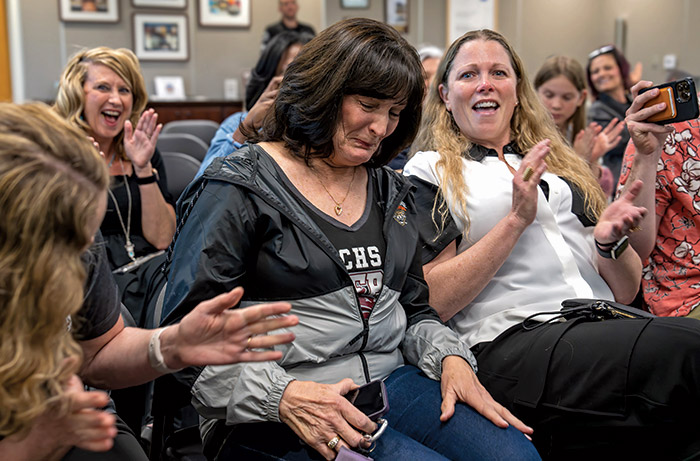
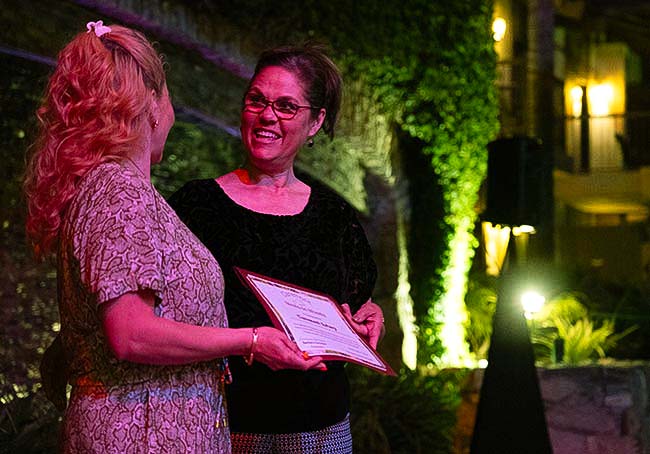
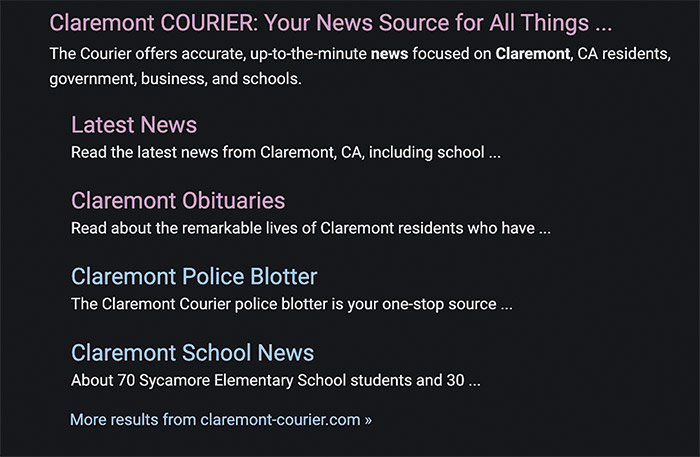

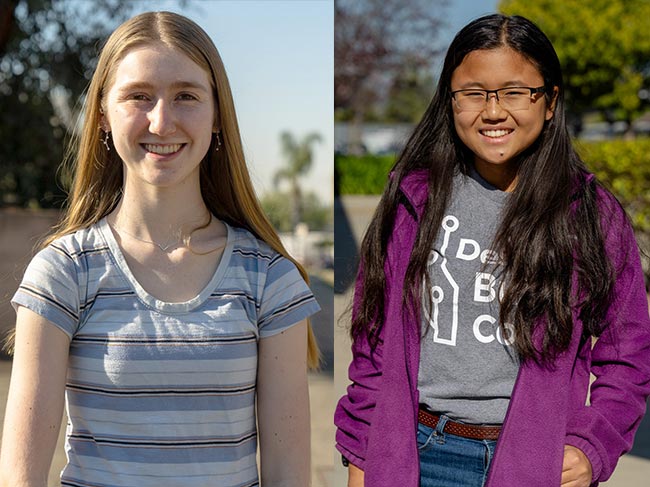

0 Comments